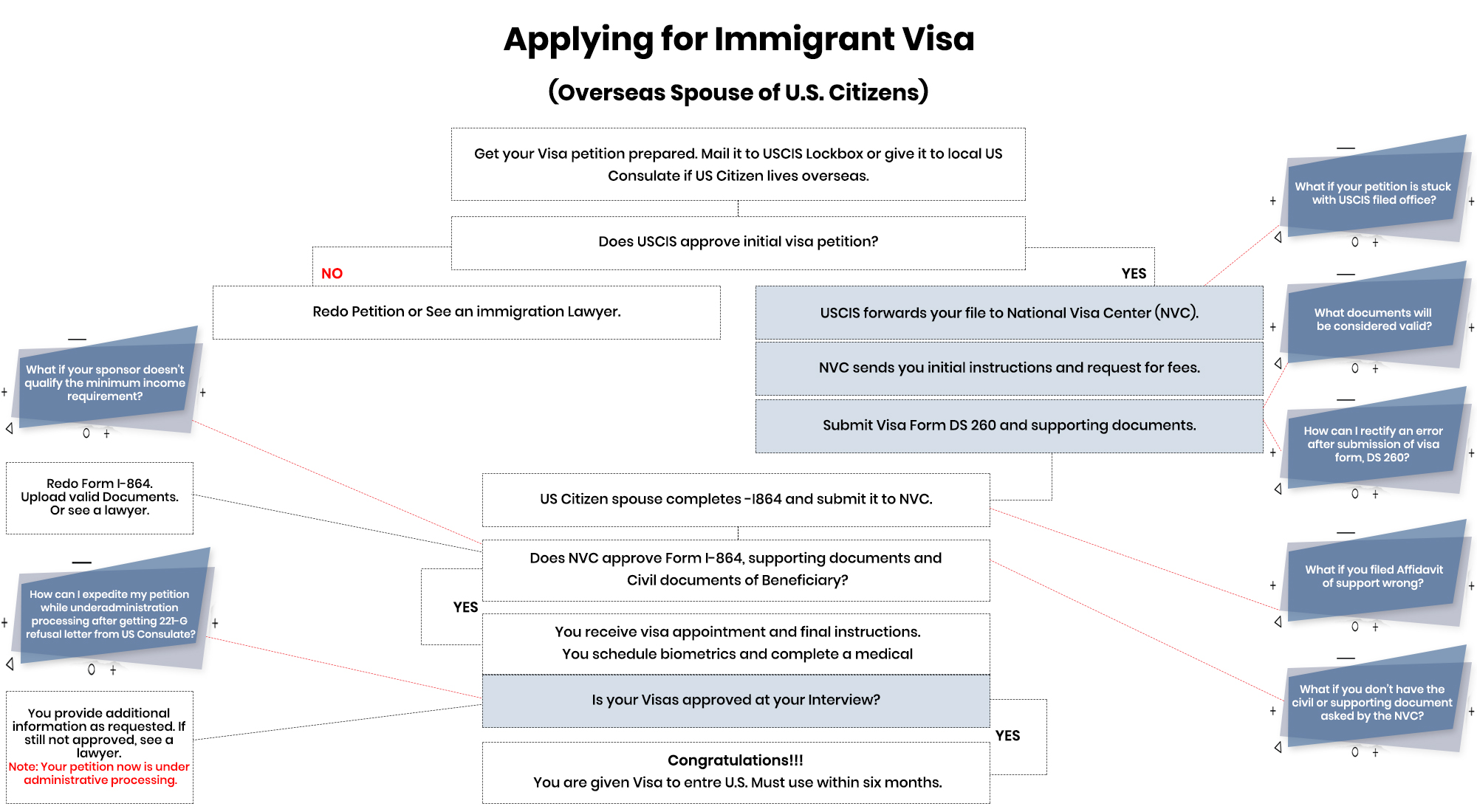FAQ-Family Petition
Family Based Immigrant Visa
FREQUENTLY ASKED KNOWLEDGE BASED QUESTIONS
FAQ-Family Petition
What is the eligibility for I-485 adjustment of status for family-based immigration?
An intended Immigrant should either have approved family-based I-130 immigrant petition or filing it concurrently at any possible time. The family-based petition categories include parent, child, fiancé, and other immediate relatives of either United States citizens or Green Card holders.
What is the Priority Date in the visa petition?
The priority date is the date of filing with USCIS. For a family-Based petition case, this will be the date the I-130 Petition for Intended Immigrant Relative is filed, which may or may not be the same date as the adjustment of status (I-485) is filed.
What are the requirements for immigration photographs?
The USCIS will accept standard passport photographs where the intended Immigrant is facing the camera.
Why Priority Date is important?
The Priority Date establishes the foreign national's place online for an immigrant visa. Limited numbers of visas available for each of the categories. Such petition categories are called the Preference Category. Each preference category has its own waiting period for immigrant visas, and the priority date and the preferred category of the petition determine how long the applicant has to wait for his/her Green Card.
Will my Family based petition be denied if I forget to include a few supporting documents?
Your petition will not be denied, in this case, it will be delayed. If the supporting documents are insufficient, USCIS will send you a Request for Evidence, requesting additional supporting documents. You can then submit copies of the required documents.
Which affidavit of support form must accompany under visa processing for family-based petition?
You must file Form I-864, Affidavit of Support, along with your financial and supporting documents. This is applicable for both visa processing that is adjustment of status or Consular Processing.
Will my relative be required to appear for an interview?
Yes. Your relative will be interviewed by an overseas consular officer while applying for an immigrant visa or by a USCIS officer while applying for an adjustment of status. Prior to getting a Green Card, Your relative will be interviewed, at some time or the other.
Do I have to appear for the interview with my relative?
If your relative is abroad and if he or she going through Consular Processing, you need not be present with your relative for the interview. But you need to be present with the beneficiary if your relative is in America and is applying for adjustment of status.
Will my relative get a Green Card soon after the interview?
No. A Green Card will not be issued immediately. If your relative is abroad, an immigrant visa will be issued to him/her. With that visa, your relative can travel to the United States and then get a Green Card. If your relative is in America, after the approval of Form I-130 and I-485 and after the interview, you can get his/her passport stamped. The I-551 stamp on the passport will help your relative to establish that he/she is a permanent resident. Your relative can use that as a proof of status until a Green Card is issued.
How long is an immigrant visa good for?
Immigrant visas are good only for a six-month period. Your relative must get into the United States within that six-month period.
Who can file a petition for a family member to come to the U.S. and get a green card?
The U.S citizens can file a petition for their siblings. spouses, parents, and children. Lawful permanent residents can file a petition for their spouses and unmarried children.
You have to follow few steps and there are some requirements for getting a green card for each person, and it totally depends on the petitioner’s immigration status in the U.S. and most importantly is a relationship with the family member. There are so many things that will be considered, as:
The United States Immigration law is complicated and making mistakes can be serious. If your family member is in the United States without legal status and files an improper filling application to get a green card, risk deportation is high. Talk to our immigration attorney before you do anything in the wrong way.
How would a Green Card Holder (lawful permanent resident) get a green card for his/her family member?
You have to follow the instructions at the link below from USCIS if you are a permanent resident applying for your unmarried child under 21 years, or an unmarried child over 21 years or your spouse.
If your family member has ever lived in the United States without any legal status, he/she may be ineligible to get a green card, or he/she may require a waiver, depending on the circumstances.
Please Consult our F4 India immigration attorney before you file any immigration application.
How can I get an immigrant visa to the United States through family members?
Families and Individuals may get immigration to the U.S if you are a beneficiary of a petition filed by your relative who is a lawful permanent resident of the United States citizen U.S. immigration system gives priority to immediate relatives (parents, spouses, and unmarried children under age 21years) of U.S. citizens. Other categories of family relationships—for instance, spouses of permanent residents and brother/sister of U.S. citizens, etc.—are subject to numerical visa caps, and there is a complex preference system. They have to wait several years before they can apply to immigrate to the United States So it is always very important to talk to an experienced immigration attorney about your family-based immigration options. For more information, you can call us or write an email.
Can family members of people with 245i get their green cards in the U.S.?
Certain family members of people who were the named beneficiary of 245i protected Immigrant Petitions and Labor Certification Applications rule also can get their green cards in the U.S. under this exception. These can include certain spouses and minor children, including those who were either a spouse or minor child (under 21 and unmarried) at the time the person either 1) had the Immigrant Petition or Labor Certification Application filed for them; or 2) applied for their own green cards.
Does it matter which country your relative live presently ?
It matters, Yes each country is only allowed a few number of visas every year.
Every year so many visa petitions filed for citizens of China, India, Mexico, and the Philippines but the number of visas available to those countries are very less. People China, India, Mexico, and the Philippines often have to wait longer for a visa.
Current wait times for getting visa can range anywhere from two to twenty five years depending on your relative’s country of origin or your status in the United States and the petition category of family relationship the immigration is based on. Check your priority date in the Visa Bulletin.
What is your visa priority date? How do i find my “priority date” is?
The visa priority date decides when your visa is available, and when you are able to move forward in the process. Your priority date is listed on your family petition receipt or approval notice i.e. 797-C notice of action. For more details kindly contact our office.
What is Visa Bulletin? How do I read the Visa Bulletin?
Each month after 15th, The DOS (Department of State) publishes a Visa Bulletin in their website lists which shows the current priority dates for each visa category by country.
The Visa Bulletin shows both family-based immigration and employment-based immigration.
While checking the Visa Bulletin for your family member, you should find the family chart and the preference category (F1, F2A, F2B, F3, or F4) for the family member you are applying for.
If your family member is immigrating from one of the countries listed at the top of the chart, find the priority date below that matches the preference category for your family member.
If your family member is not from one of the countries listed at the top, use the dates in the “All Charge-ability Areas Except Those Listed” category. If your priority date on your family petition receipt or approval notice is before the date listed in the Visa Bulletin, there is a visa available for your family member or they are able to submit their application.
If your priority date in the I-130 receipt is on or after the listed date, there is not yet a visa available for your family member or they are not yet able to submit their application. You must have to wait.
So you have to Keep in mind that the dates listed in the Visa Bulletin depends on the number of visa applications that were received from the different countries for the different visa categories.
The dates on the Visa Bulletin do not move fast.
For example, if on Oct 1, 2019, the priority date listed for your category is Oct 1, 2024, then that does not mean that a visa will be available in five years. For many months, the date on the Visa Bulletin will not change or only change a few days—and it may even move backward. In the example above, five years gives you a general idea for your waiting time.

